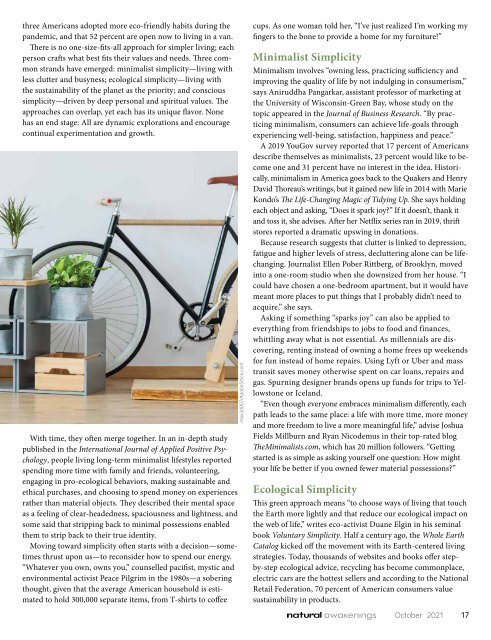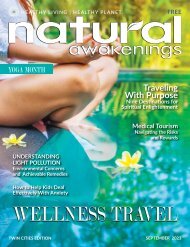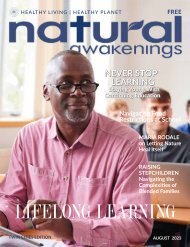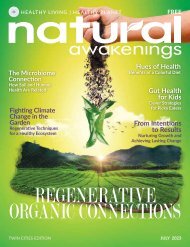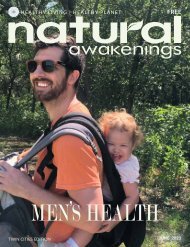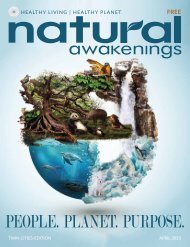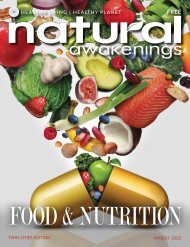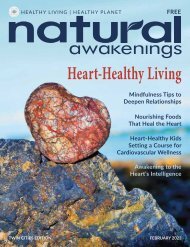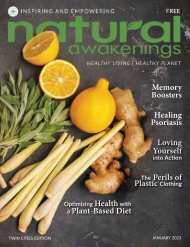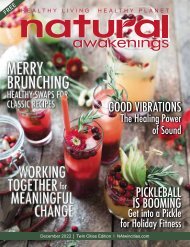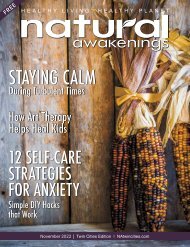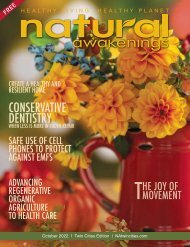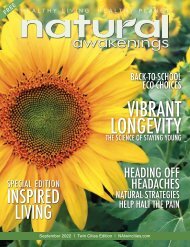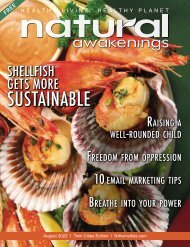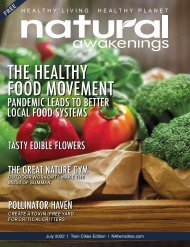Natural Awakenings Twin Cities October 2021
Read the October 2021 edition of Natural Awakenings Twin Cities magazine. This is our annual Healthy Planet Issue which is focused on Living a Simpler Lifestyle and Breast Health. Topics also include the fall fruit recipes, water scarcity, tips on grieving, talking with your children about climate change, cannabis for your pets and so much more! Be sure to check out our local content including News Briefs announcements, Community Resource Guide with providers throughout the metro who can meet your individual wellness needs, and all the happenings in the Calendar of Events. There is additional online-only content that can be found at NATwinCities.com. While you are there, be sure to sign up for our Newsletter and Digital Magazine and continue your reading with our archived articles from local experts.
Read the October 2021 edition of Natural Awakenings Twin Cities magazine. This is our annual Healthy Planet Issue which is focused on Living a Simpler Lifestyle and Breast Health. Topics also include the fall fruit recipes, water scarcity, tips on grieving, talking with your children about climate change, cannabis for your pets and so much more!
Be sure to check out our local content including News Briefs announcements, Community Resource Guide with providers throughout the metro who can meet your individual wellness needs, and all the happenings in the Calendar of Events. There is additional online-only content that can be found at NATwinCities.com.
While you are there, be sure to sign up for our Newsletter and Digital Magazine and continue your reading with our archived articles from local experts.
Create successful ePaper yourself
Turn your PDF publications into a flip-book with our unique Google optimized e-Paper software.
three Americans adopted more eco-friendly habits during the<br />
pandemic, and that 52 percent are open now to living in a van.<br />
There is no one-size-fits-all approach for simpler living; each<br />
person crafts what best fits their values and needs. Three common<br />
strands have emerged: minimalist simplicity—living with<br />
less clutter and busyness; ecological simplicity—living with<br />
the sustainability of the planet as the priority; and conscious<br />
simplicity—driven by deep personal and spiritual values. The<br />
approaches can overlap, yet each has its unique flavor. None<br />
has an end stage: All are dynamic explorations and encourage<br />
continual experimentation and growth.<br />
With time, they often merge together. In an in-depth study<br />
published in the International Journal of Applied Positive Psychology,<br />
people living long-term minimalist lifestyles reported<br />
spending more time with family and friends, volunteering,<br />
engaging in pro-ecological behaviors, making sustainable and<br />
ethical purchases, and choosing to spend money on experiences<br />
rather than material objects. They described their mental space<br />
as a feeling of clear-headedness, spaciousness and lightness, and<br />
some said that stripping back to minimal possessions enabled<br />
them to strip back to their true identity.<br />
Moving toward simplicity often starts with a decision—sometimes<br />
thrust upon us—to reconsider how to spend our energy.<br />
“Whatever you own, owns you,” counselled pacifist, mystic and<br />
environmental activist Peace Pilgrim in the 1980s—a sobering<br />
thought, given that the average American household is estimated<br />
to hold 300,000 separate items, from T-shirts to coffee<br />
max3d007/AdobeStock.com<br />
cups. As one woman told her, “I’ve just realized I’m working my<br />
fingers to the bone to provide a home for my furniture!”<br />
Minimalist Simplicity<br />
Minimalism involves “owning less, practicing sufficiency and<br />
improving the quality of life by not indulging in consumerism,”<br />
says Aniruddha Pangarkar, assistant professor of marketing at<br />
the University of Wisconsin-Green Bay, whose study on the<br />
topic appeared in the Journal of Business Research. “By practicing<br />
minimalism, consumers can achieve life-goals through<br />
experiencing well-being, satisfaction, happiness and peace.”<br />
A 2019 YouGov survey reported that 17 percent of Americans<br />
describe themselves as minimalists, 23 percent would like to become<br />
one and 31 percent have no interest in the idea. Historically,<br />
minimalism in America goes back to the Quakers and Henry<br />
David Thoreau’s writings, but it gained new life in 2014 with Marie<br />
Kondo’s The Life-Changing Magic of Tidying Up. She says holding<br />
each object and asking, “Does it spark joy?” If it doesn’t, thank it<br />
and toss it, she advises. After her Netflix series ran in 2019, thrift<br />
stores reported a dramatic upswing in donations.<br />
Because research suggests that clutter is linked to depression,<br />
fatigue and higher levels of stress, decluttering alone can be lifechanging.<br />
Journalist Ellen Pober Rittberg, of Brooklyn, moved<br />
into a one-room studio when she downsized from her house. “I<br />
could have chosen a one-bedroom apartment, but it would have<br />
meant more places to put things that I probably didn’t need to<br />
acquire,” she says.<br />
Asking if something “sparks joy” can also be applied to<br />
everything from friendships to jobs to food and finances,<br />
whittling away what is not essential. As millennials are discovering,<br />
renting instead of owning a home frees up weekends<br />
for fun instead of home repairs. Using Lyft or Uber and mass<br />
transit saves money otherwise spent on car loans, repairs and<br />
gas. Spurning designer brands opens up funds for trips to Yellowstone<br />
or Iceland.<br />
“Even though everyone embraces minimalism differently, each<br />
path leads to the same place: a life with more time, more money<br />
and more freedom to live a more meaningful life,” advise Joshua<br />
Fields Millburn and Ryan Nicodemus in their top-rated blog<br />
TheMinimalists.com, which has 20 million followers. “Getting<br />
started is as simple as asking yourself one question: How might<br />
your life be better if you owned fewer material possessions?”<br />
Ecological Simplicity<br />
This green approach means “to choose ways of living that touch<br />
the Earth more lightly and that reduce our ecological impact on<br />
the web of life,” writes eco-activist Duane Elgin in his seminal<br />
book Voluntary Simplicity. Half a century ago, the Whole Earth<br />
Catalog kicked off the movement with its Earth-centered living<br />
strategies. Today, thousands of websites and books offer stepby-step<br />
ecological advice, recycling has become commonplace,<br />
electric cars are the hottest sellers and according to the National<br />
Retail Federation, 70 percent of American consumers value<br />
sustainability in products.<br />
<strong>October</strong> <strong>2021</strong><br />
17


